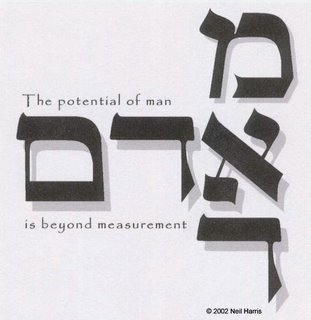The first letter, written by "Benjamin" introduces a "series of accusations against Judaism", these accusations against Yiddishkeit make up the framework for TNL. Rav Hirsch, as "Naphtali", starts to deal with these accusations by replying:
"Do you believe that you really understand the object whichOften, when people make judgement calls about a Torah observant lifestyle it is based on either an outside point of view or what many refer to as "bad religious experiences". Rav Hirsh urges the reader to judge Torah Judaism from within and based on its own merit (this is a theme throughout Rav Hirsch's writings and it will come up again when we visit Letter Two).
you are thus condemning? Have you acquired with your own eyes, and by the
dint of honest, earnest investigation, an actual understanding of the matter
which, inasmuch as it is the holiest and most important consideration of our
life, should at least not be cast aside thoughtlessly and
unreflectingly?"
"Benjamin" then says:
You showed me that the only sources of my knowledge were,
on the one hand, the mechanical practice of parental customs and a few imperfect
and undigested fragments of the Bible and Talmud acquired from Polish
teachers
It's important to remember that Rav Hirsch is portraying "Benjamin" as someone who was raised observant and has changed his "religious views and practices" (from page 1). Today we see children and young adults falling into the category of "at-risk" and "off the derech". While TNL letters was written as a weapon against the Haskallah, even in 1836 he is addressing the exact same issues Torah observant Judaism is dealing with today.
The phrase "mechanical practice of parental customs" demonstrates the need for parents to not only give over minhagim to their children, but explain the source of the minhag. Yiddishkeit by rote, without emotion and explanation is a common "cause" for children to indeed be "at-risk" and "off the derech".
The passage quoted above also demonstrates how the Haskallah saw the "Polish teachers" as a threat. It's interesting to note that when Feldheim republished TNL in a new edition in 1960 prepared by Jacob Breuer, they replace the phrase "Polish teachers" with "old-fashioned Cheder." Either phrase is a direct attack against an age old system of chinuch. The student-Rebbe relationship is something that goes back to Moshe Rabbenu and is a vital part of our religion.
Page 2 ends with a reference to:
modern reformers, and especially that view of life which
our present age has brought forth, and which has, as its chief endeavor, the
suppression of the inner voice of conscience in favor of the external demands of
comfort and ease.
I believe that this refers to the "reformation" of Judaism and the accusation (that come up later in Letter One) that the traditional Torah lifestyle is outdated and too difficult to adhere to in the modern world. An example of this might be the lure of eating non-kosher so that one may not stand out in society.
Thank you for taking time to read this and please feel free to comment.
